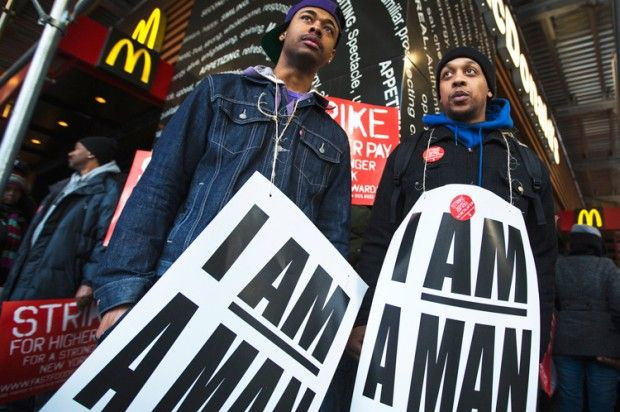Fast-Food Chains Are Supersizing Your Taxes [Infographic]

That McDouble from the Dollar Menu might not be quite the bargain you think it is. In 2012, fast-food giant McDonald’s (NYSE:MCD) cost the U.S. government (and taxpayers) $1.2 billion, according to a just-released paper from the National Employment Law Project.
The low wage--no benefits compensation "packages" that McDonald's and most other fast-food chains pay their restaurant workforce is costing U.S. taxpayers a lot of money. In fact, just the top 10 largest chains combined cost the U.S. government $3.8 billion in 2012. The reason? Low-wage workers who don’t receive benefits have to rely on public assistance to afford health care, food and other necessities. More than half of all fast-food workers participate in public assistance programs like Medicaid and SNAP (food stamps), programs that are funded by taxpayer dollars.
Meanwhile, these same top 10 fast-food chains earned $7.4 billion in profits, paid their CEOs a combined $52.7 million and distributed $7.7 billion in dividends and buybacks.
But these profits weren’t exactly evenly distributed among the 10 companies. McDonald’s and Yum! Brands (NYSE:YUM), the two largest fast-food chains and the two that cost the government the most money, are the only ones that actually seem profitable.
Three of the top 10 companies are privately held, so their profitability is hard to gauge. However, five of the top 10 largest fast-food companies don’t even make as much money as they cost the U.S. government.
Burger King (NYSE:BKW), Wendy’s (NASDAQ:WEN), Dunkin’ Donuts (NASDAQ:DNKN), Sonic (NASDAQ:SONC) and Domino’s (NYSE:DPZ) cost the cost the government approximately $1.2 billion combined but earned only $381.6 million in 2012.
Of these five companies, Wendy’s appears to be the least profitable. The company cost the U.S. government $278 million in 2012, but earned only $7.1 million in profits in the same year.
So there's a lot wrong with this picture. The government is subsidizing these large corporations that not only don’t provide any public benefit but are actually contributing to the obesity epidemic. And these corporations aren’t even very good at being corporations -- that is, if you define a good corporation as one that's profitable.
Here’s an infographic that compares how much the 10 largest fast-food chains cost the government, and how much money they make:

© Copyright IBTimes 2024. All rights reserved.






















